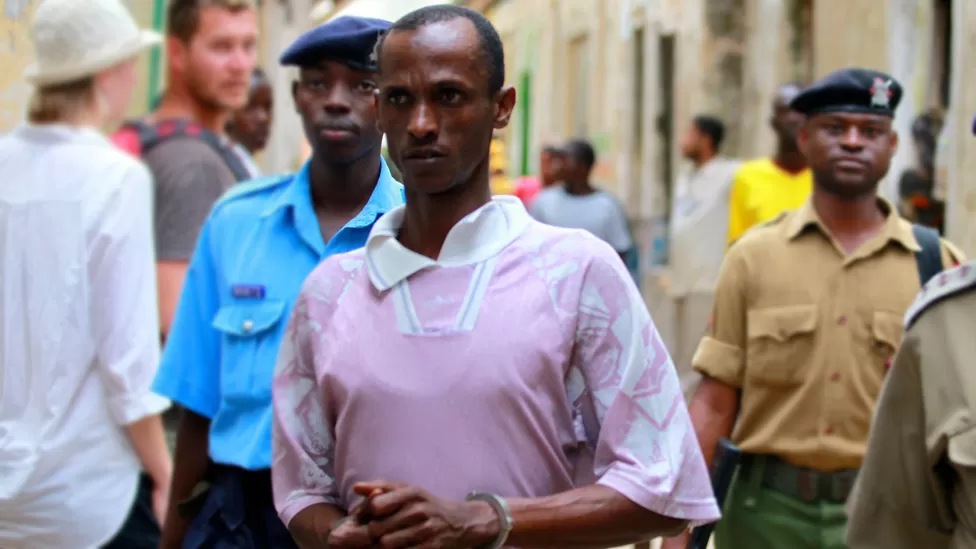International
Kenyan Exonerated Over UK Tourist David Tebbutt’s Murder

An innocent man who was sentenced to death following the 2011 murder of a British tourist has had his conviction overturned at the Kenyan High Court.
Ali Kololo was convicted of robbery with violence in 2013, after David Tebbutt was shot dead by suspected pirates.
His sentence, later commuted to life imprisonment, has now been quashed.
Mr Tebbutt’s wife, Jude – who has supported Mr Kololo’s fight for justice – said she was “overjoyed”.
Mr Tebbutt and his wife Jude were staying at a secluded beachside resort on the Kenyan coast in 2011, when they came under attack by pirates. Mr Tebbutt was killed and Mrs Tebbutt was held hostage in nearby Somalia for six months. She was only released after her adult son, Olly, negotiated a ransom deal.
Following Ali Kololo’s exoneration, Mrs Tebbutt – who has always maintained that he was not part of the gang that murdered her husband and campaigned for his release – said barely a day had gone by over the past decade when she had not thought of him.
“I’m not able to tell him face to face, but if I could, I would like to say: ‘Ali I am so sorry that this happened to you and that you, your family and children have suffered so much.
“‘What happened to you was not right and [was] unfair, but I hope that over time you can all make a life for yourselves and find peace,'” Mrs Tebbutt said.
Mr Kololo’s release comes after a ten-year campaign by human rights group, Reprieve.
Distinctive footwear he was allegedly wearing had been presented as crucial evidence at his 2013 trial and used to link him to the scene.
But in February 2023, at an appeal supported by Reprieve, Kenya’s director of public prosecutions decided his conviction had been based on hearsay evidence about him wearing the shoes, and presented to the court without disclosure of where the information had come from.
Mr Kololo was then freed from Mombasa’s Shimo La Tewa maximum security prison where he had been held for 11 years, pending today’s judgment, which formally quashed his conviction.
In 2022 the BBC also revealed that a senior Metropolitan police officer who assisted the Kenyan investigation “omitted key forensic evidence” in Mr Kololo’s trial.
The UK’s Independent Office for Police Conduct (IOPC), which had been investigating Det Ch Insp Neil Hibberd’s role in the case since June 2018, had concluded that “had the officer still been serving, he would have had a case to answer for gross misconduct”. The IOPC had not made public its findings.
Neil Hibberd, who retired in 2017, “absolutely disagrees with the [IOPC] findings”, his lawyer told the BBC at the time.
However, speaking following Mr Kololo’s exoneration, Mrs Tebbutt said she was “very concerned that the British police have been deeply implicated in this travesty of justice.”
At his trial, Mr Kololo did not have a lawyer until after the prosecution had set out its case and, despite speaking no English, had to cross-examine prosecution witnesses, including Neil Hibberd. He was later represented by pro bono lawyer, Alfred Olaba, who said the pleasure of seeing Mr Kololo reunited with his family was mixed with sadness.
“It is hard to talk of justice when an innocent young man has lost 11 years of his life to a rigged investigation and unfair trial,” Mr Olaba said. “But today, Kenyan courts finally began to right this terrible wrong.”
Maya Foa, director of Reprieve, said it was “a tragedy that it took so long to reach this point”, adding: “Ali Kololo’s trial was one of the most unfair imaginable.
“The imbalance of power in the courtroom was staggering, between the senior Metropolitan Police detective testifying for the prosecution and the illiterate defendant, being tried in a language he did not understand, without the aid of a lawyer for most of the trial.”
Credit: BBC
Advertise or Publish a Story on EkoHot Blog:
Kindly contact us at [email protected]. Breaking stories should be sent to the above email and substantiated with pictorial evidence.
Citizen journalists will receive a token as data incentive.
Call or Whatsapp: 0803 561 7233, 0703 414 5611














